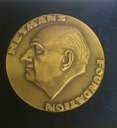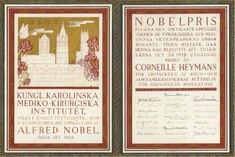Heymans Instituut
Heymans Instituut
De geschiedenis van het Heymans Instituut voor Farmacologie verloopt parallel met de evolutie van de moderne farmacologie. Het Heymans Instituut werd gesticht in 1890 toen professor Jan-Frans Heymans (1859-1932) de eerste leerstoel voor experimentele farmacologie in België opnam.
Aanvankelijk spitste het Instituut zich toe op het beoefenen van experimentele geneeskunde. Op basis van zorgvuldig geplande experimenten en gebruik makend van originele technieken, werden de regulerende werkingsmechanismen van het cardiovasculair- en ademhalingsstelsel alsook de invloed van farmaca op deze regulering ontrafeld.
Dit resulteerde in de ontdekking door professor Corneel HEYMANS (1892-1968) 
Na de tweede wereldoorlog spitste het Heymans Instituut zich meer speciaal toe op de Farmacologie. Op dit ogenblik is het Instituut actief op gebied van onderwijs, onderzoek en dienstverlening.
Heymans Memorial Lectures
In 1972 richt
De Stichting organiseert de Heymans Memorial Lectures, welke bij speciale gelegenheden gegeven worden door zeer gerenommeerde onderzoekers in het gebied van de fysiologie of farmacologie. Ter herinnering aan hun spreekbeurt, ontvangen de onderzoekers de Medaille van de Heymans Stichting.
Tot heden werden 12 Heymans Memorial Lectures gegeven; deze in 1977 was een dubbele spreekbeurt. De 11e Heymans Memorial Lecture werd gegeven ter gelegenheid van het "Nobel Prize Corneel Heymans 1938 - 75 Years Memorial Symposium" in Gent op 7 november 2013.
12th Heymans Memorial Lecture - Ghent, September 14, 2015
Development of arterial stiffness as a cardiovascular biomarker
S. LAURENT, Pharmacology Department & INSERM U 970, Hôpital Européen Georges Pompidou, Paris, France
11th Heymans Memorial Lecture – Ghent, November 7, 2013
Gastrointestinal anti-inflammatory effects of hydrogen sulfide releasing molecules
J. WALLACE, McMaster University, Hamilton and Antibe Therapeutics Inc., Toronto, Canada
10th Heymans Memorial Lecture – Brussels, October 25, 2008
Pharmacogenomics and individualized drug therapy
M. EICHELBAUM, University of Tübingen, Germany
9th Heymans Memorial Lecture – Ghent, November 8, 2006
Nitric oxide as a unique signalling molecule in the cardiovascular system
L. IGNARRO, University of California, Los Angeles, USA
Nobel Prize 1998
8th Heymans Memorial Lecture – Knokke, October 17, 1998
Lessons of Life
C. DE DUVE, Institute of Cellular Pathology, Brussels, Belgium
Nobel Prize 1974
7th Heymans Memorial Lecture – Ghent, February 18, 1995
Physiological aspects of small arteries
M.J. MULVANY, University of Aarhus, Denmark
6th Heymans Memorial Lecture – Brussels, November 27, 1992
De betekenis van het basaal medisch biologisch onderzoek voor de geneeskunde
D. DE WIED, Rudolf Magnus Institute, Utrecht, The Netherlands
5th Heymans Memorial Lecture – Ghent, February 17, 1990
Co-transmission
G. BURNSTOCK, University College London, England
4th Heymans Memorial Lecture – Brussels, October 29, 1983
Drugs for developing countries : Strategies for the control of infectious diseases
P.A. JANSSEN, Janssen Research Foundation, Beerse, Belgium
3rd Heymans Memorial Lecture – Ghent, May 6, 1977
50 Years of research on the pharmacodynamics of psychotropic drugs
D. BOVET, University of Rome, Italy
Nobel Prize 1957
Development of ideas about noradrenaline receptors
J. BLACK, University of London, England
Nobel Prize 1988
2nd Heymans Memorial Lecture – Ghent, March 29, 1974
The role of the biochemist in medical research in the past and the future
E. CHAIN, University of London, England
Nobel Prize 1945
1st Heymans Memorial Lecture – Ghent, March 24, 1972
Some aspects of the actions of prostaglandins
U.S. VON EULER, Karolinska Institute, Stockholm, Sweden
Noble Prize 1970
